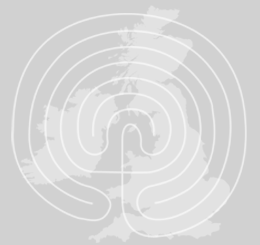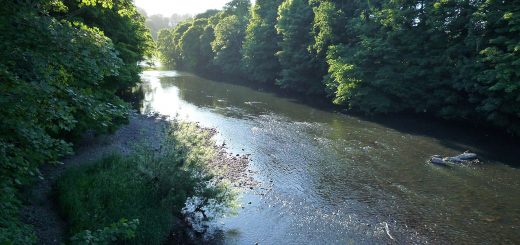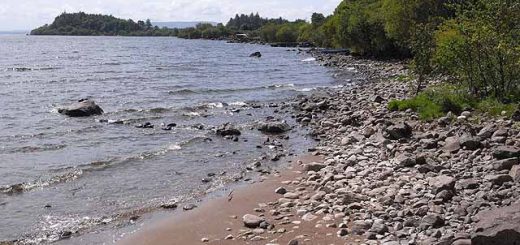River Artro
Whilst reading part of Lewis’s Topographical Dictionary of Wales (1849), I came across a link between the River Artro and Taliesin. ‘At the mouth of the river, according to some accounts, was anciently situated a weir, granted by Gwyddno Goronhîr, a petty prince of Cantrêv Gwaelod, to his son Elphin, by whom was discovered, in a coracle hanging from one of the poles of the weir, the infant Taliesin, who afterwards became the celebrated British bard of that name, and who had been exposed in this situation soon after his birth. Elphin, taking compassion on the infant, had him carefully brought up and properly educated’ Whether this is the correct location is hard to say. This is what the Mabinogion translated by Lady Charlotte Guest tells us: ‘Gwyddno Garanhir was sovereign of Gwaelod, a territory bordering on the sea. And he possessed a weir upon the strand between Dyvi and Aberstwyth, near to his own castle, and the value of an hundred pounds was taken in that weir every May eve, And Gwyddno had an only son named Elphin, the most helpless of youths, and the most needy. And it grieved his father sore, for he thought he was born in an evil hour. By the advice of his council his father had granted him the drawing of the weir that year, to see if good luck would ever befall him, and to give him something wherewith to begin the world. And this was on the twenty-ninth of April.’
 ‘The next day, when Elphin went to look, there was nothing in the weir but a leather bag upon a pole of the weir. Then said the wier-ward unto Elphin, “All thy ill-luck aforetime was nothing to this; and now thou hast destroyed the virtues of the weir, which always yielded the value of an hundred pounds every May eve; and to-night there is nothing but this leathern skin in it.” “How now,” said Elphin, “there may be therein the value of a hundred pounds.” Well! they took up the leathern bag, and he who opened it saw the forehead of an infant, the fairest that was ever seen; and he said, “Behold a radiant brow!” (in the Welsh language, taliesin.) “Taliesin be he called,” said Elphin. And he lifted the bag in his arms, and, lamenting his bad luck, placed the boy sorrowfully behind him. And he made his horse amble gently, that before had been trotting, and he carried him as softly as if he had been sitting in the easiest chair in the world. And presently the boy made a Consolation and praise to Elphin; and the Consolation was as you may here see:-
‘The next day, when Elphin went to look, there was nothing in the weir but a leather bag upon a pole of the weir. Then said the wier-ward unto Elphin, “All thy ill-luck aforetime was nothing to this; and now thou hast destroyed the virtues of the weir, which always yielded the value of an hundred pounds every May eve; and to-night there is nothing but this leathern skin in it.” “How now,” said Elphin, “there may be therein the value of a hundred pounds.” Well! they took up the leathern bag, and he who opened it saw the forehead of an infant, the fairest that was ever seen; and he said, “Behold a radiant brow!” (in the Welsh language, taliesin.) “Taliesin be he called,” said Elphin. And he lifted the bag in his arms, and, lamenting his bad luck, placed the boy sorrowfully behind him. And he made his horse amble gently, that before had been trotting, and he carried him as softly as if he had been sitting in the easiest chair in the world. And presently the boy made a Consolation and praise to Elphin; and the Consolation was as you may here see:-
Never in Gwyddno’s weir
Was there such good luck as this night.
Being sad will not avail;
Better to trust in God than to forebode ill;
Weak and small as I am,
On the foaming beach of the ocean,
In the day of trouble I shall be
Of more service to thee than three hundred salmon.”
This was the first poem that Taliesin ever sung, being to console Elphin in his grief for that the produce of the weir was lost and, what was worse, that all the world would consider that it was through his fault and ill-luck. Then Elphin asked him what he was, whether man or spirit. And he sung thus:-
Although I am but little, I am highly gifted;
Into a dark leathern bag I was thrown,
And on a boundless sea I was set adrift.
From seas and from mountains
God brings wealth to the fortunate man.”
 ‘Then came Elphin to the house of Gwyddno, his father, and Taliesin with him. Gwyddno asked him if he had had a good haul at the weir, and he told him that he had got that which was better than fish. “What was that?” said Gwyddno. “A bard,” said Elphin. Then said Gwyddno, “Alas! what will he profit thee?” And Taliesin himself replied and said, “He will profit him more than the weir ever profited thee.” Asked Gwyddno, “Art thou able to speak, and thou so little?” And Taliesin answered him, “I am better able to speak than thou to question me,” “Let me hear what thou canst say,” quoth Gwyddno. Then Taliesin sang:-
‘Then came Elphin to the house of Gwyddno, his father, and Taliesin with him. Gwyddno asked him if he had had a good haul at the weir, and he told him that he had got that which was better than fish. “What was that?” said Gwyddno. “A bard,” said Elphin. Then said Gwyddno, “Alas! what will he profit thee?” And Taliesin himself replied and said, “He will profit him more than the weir ever profited thee.” Asked Gwyddno, “Art thou able to speak, and thou so little?” And Taliesin answered him, “I am better able to speak than thou to question me,” “Let me hear what thou canst say,” quoth Gwyddno. Then Taliesin sang:-
“Three times have I been born, I know by meditation;
All the sciences of the world are collected in my breast,
For I know what has been, and what hereafter will occur.”
‘Elphin gave his haul to his wife, and she nursed him tenderly and lovingly. Thenceforward Elphin increased in riches more and more, day by day, and in love and favor with the king; and there abode Taliesin until he was thirteen years old’




Tilting Country
The proposed location of the weir in question would not be accurate on the above map. Instead it would have been a lot closer to Llanbedr itself. Nearby Harlech Castle used to have the sea lapping around its base, where as now it stands roughly a mile from the beach. I saw an explanation for this using Harlech as an example. It suggested that during the Ice Age the weight of the ice pressed the United Kingdom down, and after it retreated the plate has been slowly springing back to its natural position. This means that the west of the country is rising slowly hence places like Harlech Castle are getting further from the sea and locations on the east of the country are dipping slightly, therefore we see the tide coming further up the River Thames than it used to do centuries ago. There are standing stones in Llanbedr that may have been markers visible from the sea.